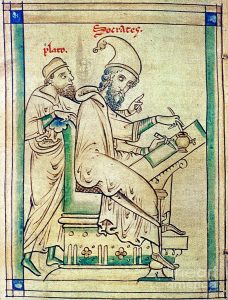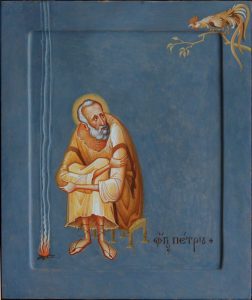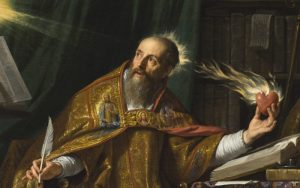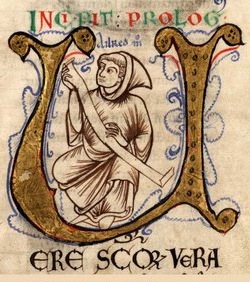 Many people have difficulty with the idea of God.
Many people have difficulty with the idea of God.
Yet classical theology can still be a tremendous help on the spiritual path. The theologians of the Church’s early centuries were under no illusions that God was something like a man in the sky. No, the word “God” was for them a sign that pointed to a mystery.
They knew that there was a sacred mystery at the heart of life—which could be glimpsed, but never grasped. They were philosophers and poets, not the scientists of modernism. They knew that we speak of ultimate things only in symbols.
In Brief: Our Ancient Inheritance
Ancient philosophers commonly held that, whatever the ultimate mystery might be, it must be one. That is just because “the one is the cause of the many”, as Plato had said. (Plato's Parmenides; qv. Thomas Aquinas' Summa Theologiae Bk 1 art. 44, q. 1) We must come from a source which is unitary. And that source must also be spiritual; it must embrace and comprehend everything else. It is not like other material things in the universe, which have complex parts, and occupy dimensions, and decay, and die. It is perhaps something more like consciousness itself, which holds many things in its ken.
 To wonder along these lines is really to set one’s foot on the way of philosophy and theology. When we ask questions about the unity and coherence of things, our thinking becomes meditative. We wonder not only at the unity of the natural world (for which we might well give scientific answers); we wonder also about the unity of our own lives and relationships. Is there some meaning to the diverse experiences of our lives; is there some unity or coherence that holds them all together—even our sufferings and dead ends? Is there some principle by which society itself holds together: is there a spiritual bond between people, which we must nurture if we would live?
To wonder along these lines is really to set one’s foot on the way of philosophy and theology. When we ask questions about the unity and coherence of things, our thinking becomes meditative. We wonder not only at the unity of the natural world (for which we might well give scientific answers); we wonder also about the unity of our own lives and relationships. Is there some meaning to the diverse experiences of our lives; is there some unity or coherence that holds them all together—even our sufferings and dead ends? Is there some principle by which society itself holds together: is there a spiritual bond between people, which we must nurture if we would live?
Perhaps these were not exactly the questioned the Israelites asked. Yet the scriptures show that striving after unity was at the heart of their religious experience, too. Daily they recited the Shema (as observant Jews still do), which begins “Hear, O Israel, the Lord your God is one!” And though the Hebrew Scriptures contained many depictions of God—some perhaps disconcertingly human—the enduring faith of Israel, I believe, is that God is a Presence dwelling with the people. God is the mystical heart of society and culture itself. God is the people’s unity, the witness of its struggle, the One who remembers—though we do not remember, though our histories are fragmentary. In Judaism, the God who made heaven and earth is also the social bond itself: and true worship is to open oneself to this collective, self-transcending dimension—to charity, to love of neighbour.
All these ways of speaking about God flowed into Christian thought.
God is One, and One-ness. Yet we can speak of God also in other keys: we might say, for instance, that God is Truth or Goodness. We who are human are always participating in Truth and Goodness. Our thinking of course cannot reach to the fullness of Truth, though we can see something of it distantly; our speaking can still be truthful, though we cannot express the whole truth of reality. Much twentieth century theology has spoken of God as this unreachable horizon of thought. Karl Rahner said human beings have a “supernatural existential” - a rather obscure way of putting it. What he meant was that we are always reaching our to a dynamic and incomprehensible Reality - that which our language cannot capture.
Likewise also for the Good. Theologians from ancient times have spoken of the Good as an original radiance, often like the sun from which we draw our life. The Good, who is God, is the power of life itself.
Doesn't this suggest, too, that what is ethically good is somehow life-giving? When we do good we somehow transmit the original goodness that enlivens the universe. Of course, we never achieve absolute goodness, but we still strive for it. God, the ultimate reality, is none other than this goal of our striving.
Humans have always spoken of the Good; yet Christians have even more characteristically spoken of God as love (agape in Greek, and caritas in Latin). We have spoken of that love which first loved us and gave us life, the love that makes constant ethical demands, “the love that moves the sun and the other stars”. The Scriptures tell us that “God is love; and those who abide in love abide in God” (1 Jn 5).
 Now in a more metaphysical key: Christian theologians—following the Greeks, especially Aristotle (5th century BC)—have often described God as “Being.” It is a word whose meaning has remained famously elusive. Thomas Aquinas in the thirteenth century considered that "Being" described God’s nature as (something like) an ever-present backcloth to the whole universe. God is, he said, the ipsum esse per se subsistens—the uncaused, underlying reality; and this he certainly regarded as something like energy (which he called actus purus, “pure act(ivity)”). Being energises all things, and brings them to growth. Some might find this suspiciously close to pantheism: but the fact is that classical Christianity is not far from pantheism. It is probably best described as “panentheism,” holding that God is in all things, and all things in God. How, after all, is God described in the Acts of the Apostles? Just as the one "in whom we live and move and have our being."
Now in a more metaphysical key: Christian theologians—following the Greeks, especially Aristotle (5th century BC)—have often described God as “Being.” It is a word whose meaning has remained famously elusive. Thomas Aquinas in the thirteenth century considered that "Being" described God’s nature as (something like) an ever-present backcloth to the whole universe. God is, he said, the ipsum esse per se subsistens—the uncaused, underlying reality; and this he certainly regarded as something like energy (which he called actus purus, “pure act(ivity)”). Being energises all things, and brings them to growth. Some might find this suspiciously close to pantheism: but the fact is that classical Christianity is not far from pantheism. It is probably best described as “panentheism,” holding that God is in all things, and all things in God. How, after all, is God described in the Acts of the Apostles? Just as the one "in whom we live and move and have our being."
But let us come back to ideas less abstract. Christians have also characteristically spoken of God as “light,” because, in St John’s Gospel, we hear that God’s self-utterance was like a sharp light in the darkness:
In the beginning was the Word, and the Word was with God, and the Word was God. He was in the beginning with God. All things came into being through him, and without him not one thing came into being. What has come into being in him was life, and the life was the light of all people. The light shines in the darkness, and the darkness did not overcome it. (Jn 1:1-5; NRSV)
All of us have experienced the light in our own way.
What of popular theism?
Many of these ideas bear little likeness to popular theism. They suggest that God is not much like a Man, who intervenes from outside to keep the universe going and to answer prayers. Indeed not. They tell us, rather, that God is intrinsic to our lives and to the universe: God weaves Godself through it all, something like energy; in God we are always participating. Participation of one thing in another—their entwinement and analogy, or even their interbeing—is very important for Christian theology. Yet, after Thomas Aquinas in the thirteenth century it slowly faded from mind—and disastrously, according to some (cf. John Milbank et al., Radical Orthodoxy). The classical theological view is that we, and all things, are always participating in God. Therefore we may truthfully speak of God—not in absolute terms, but by analogy with our own experience, especially our experiences of goodness, truthfulness, beauty, and harmony.
 Yet some people find it disorientating to hear that God is not a human being. Their experience is like that of the monk Paphnutius in the fourth or fifth century. The abbot and chronicler, Cassian, tells that a learned deacon arrived at his monastery in the Egyptian desert. The deacon explained how the Catholic churches interpreted the passage in Genesis, "let us make man after our image and likeness.” These words cannot mean, he said, that God has a human form and likeness, since God’s nature is “incorporeal and uncompounded and simple, and … can neither be apprehended by the eyes nor conceived by the mind.”
Yet some people find it disorientating to hear that God is not a human being. Their experience is like that of the monk Paphnutius in the fourth or fifth century. The abbot and chronicler, Cassian, tells that a learned deacon arrived at his monastery in the Egyptian desert. The deacon explained how the Catholic churches interpreted the passage in Genesis, "let us make man after our image and likeness.” These words cannot mean, he said, that God has a human form and likeness, since God’s nature is “incorporeal and uncompounded and simple, and … can neither be apprehended by the eyes nor conceived by the mind.”
Yet,
the old man was so bewildered in mind during his prayer because he felt that the anthropomorphic image of [God] which he used to set before himself in prayer, was banished from his heart, that on a sudden he burst into a flood of bitter tears and continual sobs, and cast himself down on the ground and exclaimed with strong groanings: "Alas! wretched man that I am! they have taken away my God from me, and I have now none to lay hold of; and whom to worship and address I know not. (Cassian, Conferences, Conference 10, ch.2)
None of this should mean the end of prayer. We must realise, I believe, that the divine and incomprehensible Light interprets itself to us when we open ourselves in prayer, and in terms most intimate: God may communicate in convictions of the heart, in words, in fresh motivation, in new insight, in consolations, and so on. So we can truly say that God is personal. We can truly call God “our Father”. One twentieth century Anglican theologian, John Macquarrie, tried to strike the right balance when he said that God is not less than personal; God is “super-personal” (cf Principles of Christian Theology)
Yet I must make a very important qualification: according to all Christian orthodoxy, the incomprehensible God did indeed become human in Jesus of Nazareth. That means that God uttered Jesus' very humanity; that his humanity is a real sign of God. He himself, like the Temple of Judaism, was God's dwelling place. Jesus' life is therefore revelatory of God’s purposes in the world. That is what we mean by the circumlocution "Jesus is God". But his humanity remains. He was not, like a child of Zeus, a mixture of humanity and divinity. He is fully human, no more, no less. That is the doctrine of the Church.
Lastly, God reveals Godself in the Holy Spirit—in the Spirit of creativity, growth, and development, which was the beginning of the Church and which is the dynamism in all human history. What is God doing in human history? Whatever brings us life—that is surely of God.
For now let us dwell on the Light.
The Light within us
 Let's turn to perhaps the most significant thinker in western Christianity, St Augustine (c.4th century). Augustine came, through a lifetime of reflection and struggle, to realise that God was not somewhere else, and had no form—but was everywhere and, crucially, within.
Let's turn to perhaps the most significant thinker in western Christianity, St Augustine (c.4th century). Augustine came, through a lifetime of reflection and struggle, to realise that God was not somewhere else, and had no form—but was everywhere and, crucially, within.
When he considered his own inner life, he perceived his consciousness to be a kind of light: he speaks of “the light of the mind,” “the light of the soul,” or “the light of Truth” shining inwardly—and this is truly a participation in God. This is how we can experience God.
On realising this, he famously exclaimed in his Confessions:
Late have I loved you, Beauty so ancient and so new, late have I loved you! See, you were within, but I outside seeking there for you, and upon the beautiful things you have made I rushed headlong, I so unbeautiful. You were with me, but I was not with you. They held me back far from you, those things which would have no being were they not in you. You called, shouted, broke through my deafness; you flared, blazed, banished my blindness; you lavished your fragrance, I gasped, and now I pant for you; I tasted you, and I hunger and thirst; you touched me, and I burned for your peace.
God is within us! “What do I love when I love my God?” he asks:
I love a certain kind of light, and sound, and fragrance, and food, and embrace in loving my God, who is the light, sound, fragrance, food, and embrace of my inner person—where that light shines on my soul which no place can contain, where that sounds which time snatches not away, where there is a fragrance which no breeze disperses, where there is a food which no eating can diminish, and where that clings which no satiety can sunder. This is what I love, when I love my God.
Like the sun, God shines over the vast field of our inner lives—the field of our memory. “Memory,” he said, is the dwelling-place and sanctuary of God (Confessions, Book X, ch. 36); and for Augustine it implied not only what we can consciously remember but the whole realm of what we might call the “unconscious”. It is the whole fabric of our lives; and for Augustine that was a living fabric, held in being by God. When we go within, we take off from the passing world and examine what abides—a kind of eternity within.
This suggests to us an important dimension of prayer and spirituality: it is about knowing ourselves in depth. The quest for God is the quest also for ourselves. Augustine’s own autobiography, The Confessions, is itself a quest to find the God of his life, who was slowing building up a stable core, a personality—through crisis and resolution. And how indeed can we grow, if not by strength and resource of the inward light? God is the light who opens up the future for us; indeed the future is taking shape even now, in the light of God. Therefore let us stay open to it!
Our whole lives take shape in this Light; and by it, everything endures. Even what is painful or repressed we shall reintegrate when God restores us to the fullness of memory; our restoration awaits us. So Augustine came, via philosophy, to the resurrection faith of St Paul. See! The whole universe of death and decay is forming anew. If, in the end, there is light and not darkness, we are compelled to say that nothing will be lost from the universe. In the end, there is goodness—and not a void. Even after the death of our mortal bodies, we should not expect death, but transformation.
The Light between us
The God who is Presence shines not only within us, but also blazes out in human encounter—whenever there is cooperation, whenever there is self-sacrificial love.
Ancient Israel knew God as an unseen Presence dwelling in their midst. They told of God’s accompanying Israel through the desert forty years, a pillar of cloud by day, a pillar of smoke by night. God dwelt with God’s people on Mount Zion, the holy hill: here was the beating heart of the city, and its righteousness.
The idea that God is the bond of love between human beings was, if anything, accentuated with Christianity - for, as St John said, God is love (1 Jn 5). Yet Christians have often spoken of Christ or of the Holy Spirit as the bond of their unity, too: whatever the language, it points to a Presence in which we immerse ourselves. It points to a collective, self-transcending dimension of human existence - in which we recollect ourselves, and our dignity as people for others.
 The Christian Church has known many theologians of love. Consider: in twelfth century Northern England, Aelred of Rievaulx wrote On Friendship—a dialogue between the abbott, Aelred and a novice monk, Ivo.
The Christian Church has known many theologians of love. Consider: in twelfth century Northern England, Aelred of Rievaulx wrote On Friendship—a dialogue between the abbott, Aelred and a novice monk, Ivo.
Ivo speculates that “God is friendship” (amicitia)—a variation on St John’s “God is love”. God is the bond between friends! Abbott Aelred takes to it quickly; and soon the idea is radicalised. The God who is friendship is said to be not only the basis of human sociality, but the bond of all life, too. God draws all into cooperation—animals, humans, and the angels—for God is the original connectivity between things: “even soil, rivers, trees are not alone but thrive in a certain society with their own kind; there is between them ‘a certain love of companionship.’” (54)
Yet humanity, says Aelred, though originally ordered to friendship, fell into alienation and separation: “with the cooling of love, immoderate desire made secret inroads and caused private good to take precedence over the common good, [corrupting] the splendour of friendship … through avarice and envy” (59) Humans learnt to say “mine” and “yours”.
Christ is the way of reunification—the way of friendship. For Aelred, Christ (who is the human manifestation of God) is always between us and in our midst, drawing us into friendship and, therefore, beyond ourselves. Indeed the dialogue begins with Aelred’s declaration, “here we are, you and I, and I hope a third, Christ, is in our midst.”
Christ is in the realm of the between. That is why Aelred finds a surprising significance in a kiss. It is his master image. What can be more between, so to speak, than a kiss? He says “in a kiss two breaths meet, and are mingled, and are united. As a result, a certain sweetness of mind is born, which rouses and binds together the affection of those who embrace” (22). Human love is the way of union with Christ: a “friend cleaving to friend in the spirit of Christ, is made with Christ … one heart and one soul, and so mounting up through degrees of love to friendship with Christ, he is made one spirit with him in one kiss.“ (21)
The spiritual kiss is
“not made by contact of the mouth but by the affection of the heart; not by a meeting of lips but by a mingling of spirits, by the purification of all things in the Spirit of God … I would call this the kiss of Christ, yet he himself does not offer it from his own mouth, but from the mouth of another, breathing upon his lovers that most sacred affection so that there seems to them to be, as it were, one spirit in many bodies.” (26-27)
God is between us, the social bond.
 Another example, perhaps also too little known. The greatest scholar of the Western Church, Thomas Aquinas (1225-1275), also regarded Christianity as a way of friendship. Indeed, by friendship we ascend to God.
Another example, perhaps also too little known. The greatest scholar of the Western Church, Thomas Aquinas (1225-1275), also regarded Christianity as a way of friendship. Indeed, by friendship we ascend to God.
We are wayfarers (viatores) on a steep and trackless way—ascending or, alas, falling. Thomas wrote in a precise and 'scientific' style; yet so much of his vision can, I believe, be summed up imaginatively.
Imagine you are climbing a great mountain: you might gain a higher foothold; you might slip. The secret of moving higher is not to focus on ourselves—for then we become stuck, or nervous, or self-absorbed; we make unwise choices. We fall into sin, and go hurtling down and down.
No, we must look upwards towards the bright sky, if we can bear the vision of it through our squinting eyes. As we become more and more used to this light, we can look upon it more easily. We must try to forget ourselves and our frailty, becoming accustomed to the light from which we draw all our resource. Somehow, seemingly by a life and power beyond ourselves, we make it to the next foothold. And this sun is God: it is an image Thomas often used for the God who, you might remember, energises all things and brings them growth.
When we forget ourselves and look around, we see the whole cliff face, illuminated by sunlight, with its many climbers. They offer us their help; they warn of dangerous footfalls, the stones that are loose and that spin away to the earth. And we ourselves offer what help we can to those below us. We throw out some ropes; we lend a hand. We teach any new techniques we might discover.
The higher we climb, strangely, the more helpful the climbers around us seem to be: they are adepts. They have become good climbers, and most cooperative. They have learnt that climbing is as much about goodwill and sharing as it is about being quick with the rope and the hammer pins, or pitons as I think they’re called. They have become virtuous, having learnt charity, and with it, as Thomas would say, wisdom. It is not like it was at the beginning, when all those brash and competitive climbers tried to outdo one another, some of them even jumping on the backs of others: they didn’t make it.
Distantly we can see some who have made it to the top. These are related to everyone below, bestowing their friendship and wisdom on all. They are skilled at cooperating one with another: they seem to be even a single person—going out of themselves ecstatically (ecstasis). Each dwells in the heart of the other (mutua inhaesio). They are a communion, holding all things in common (communicatio, koinonia). These fully enlightened ones are the saints, and they of all people are happy. In their midst is the Christ, who shines with the full lustre of the sun. His life is fully communicable to all; he is friend to all. This is he who said, in John’s Gospel, I no longer call you servants, but friends.
St Thomas believed that Christ calls us to a radical friendship with all people. The more we explore friendship, the more we explore the mystery of Christ—who is the head of humanity (and not of 'the Church' only, in some narrow sense).
We in the twenty-first century need to learn these lessons again. God is between us—calling us beyond ourselves, calling us into cooperation. Yet too often we experience only absence and a void. Early last century, the psychoanalyst, Carl Jung, warned of this cultural crisis:
the question of human relationships and the inner cohesion of our society is an urgent one in view of the atomization of … mass [humanity], whose personal relationships are undermined by general mistrust. To enable free [people] to survive in a free word society needs a bond between individuals, an affective bond between weak and imperfect people who need each other.
For, “where love stops, power begins, and violence, and terror” (cited in Fiske, Adele Friends and Friendship in the Monastic Tradition, CIDOC 1970.)
Those are prophetic words. Our culture can only be healed by opening ourselves again to the God of all humanity—and to one another in prayer.
In God, all is one.
The light of the world
 As the Psalmist sings, “the heavens declare the glory of God, the firmament his handiwork” (Psalm 19). God is the original glory shining through the natural world—the Life from whom all things draw life.
As the Psalmist sings, “the heavens declare the glory of God, the firmament his handiwork” (Psalm 19). God is the original glory shining through the natural world—the Life from whom all things draw life.
The twentieth century English Benedictine monk, Bede Griffiths, tells of his own experience of God in nature:
One day during my last term at school I waited out alone in the evening and heard the birds singing in that full chorus of song, which can only be heard at that time of the year at dawn or sunset. I remember now the shock of surprise with which the sound broke on my ears. It seemed to me that I had never heard the birds singing before and I wondered whether they sang like this all the year round and I had never noticed it.
As I walked on I came upon some hawthorn trees in full bloom and again I thought that I had never seen such a sight or experienced such sweetness before. If I had been brought suddenly among the trees of the Garden of Paradise and heard a choir of angels singing I could not have been more surprised. I came then to where the sun was setting over the playing fields. A lark rose suddenly from the ground beside the tree where I was standing and poured out its song above my head, and then sank still singing to rest. Everything then grew still as the sunset faded and the veil of dusk began to cove the earth. I remember now the feeling of awe that came over me. I felt inclined to kneel on the ground, as though I had been standing in the presence of an angel; and I hardly dared to look on the face of the sky, because it seemed as though it was but a veil before the face of God. (Griffiths, The Golden String)
The natural world has taken shape in mysterious communion with the God of life over many ages; it is indeed a kind of sacrament—a symbol that shows forth the divine rhythm and harmony.
Yet rarely do we perceive the world like this! We suffer from a defect of sight.
Yet more radically, it seems that the environmental crisis compels us to talk of our own desecration of nature. As early as the mid-twentieth century, philosopher Martin Heidegger warned that the logic of the machine—maximum output in the minimum time—would see the technologization of all the natural world.
With the extraction of energy, the natural world is now turbo-charged: it is not as once in the age of the windmill, which kept nature’s rhythm: “Its sails do indeed turn in the wind; they are left entirely to the wind’s blowing. But the windmill does not unlock energy from the air currents in order to store it.”
When the natural rhythms of the earth are forgotten, God is eclipsed: the world is “enframed” (or perhaps entrapped) and the Holy is no more seen. No longer, said Heidegger, is the Rhine a dwelling-place for the gods, as it had been for his favourite romantic poet, Holderlin: now it is subject to the logic of the machine—a power source for a hydroelectric plant. It is wrapped up in economic relationships: it is “an object on call for inspection by a tour group ordered there by the vacation industry.” The world is disenchanted.
Successive popes have echoed Heidegger’s cry. Hear how Pope Francis begins his pastoral letter Laudato Si:
Praise be to you, my Lord, through our Sister, Mother Earth, who sustains and governs us, and who produces various fruit with coloured flowers and herbs.” This sister now cries out to us because of the harm we have inflicted on her by our irresponsible use and abuse of the good with which God has endowed her. We have come to see ourselves as her lords and masters, entitled to plunder her at will. The violence present in our hearts, wounded by sin, is also reflected in the symptoms of sickness evident in the soil, in the water, in the air and in all forms of life.
The book of Genesis, he says, expresses in symbol and story the truth that “human life is grounded in three fundamental and closely entwined relationships: with God, with our neighbour and with the earth itself.” Yet these relationships have been broken. That harmony “was disrupted by our presuming to take the place of God and refusing to acknowledge our creaturely limitations. This in turn distorted our mandate to ‘have dominion’ over the earth (cf. Gen 1:28), to ‘till it and keep it’ (Gen 2:15). As a result, the originally harmonious relationship between human beings and nature became conflictual (cf. Gen 3.17-19).”
Echoing Heidegger (as have successive popes) he says:
Technology tends to absorb everything into its ironclad logic, and those who are surrounded with technology ‘know full well that it moves forward in the final analysis neither for profit nor for the well-being of the human race’, that ‘in the most radical sense of the term power is its motive—a lordship over all’.
Furthermore:
…the accumulation of constant novelties exalts a superficiality which pulls us in one direction. It becomes difficult to pause and recover depth in life. If architecture reflects the spirit of the age, our megastructures and drab apartment blocks express the spirit of globalized technology, where a constant flood of new products coexists with a tedious monotony.
And yet there is hope! Francis says that, even now, “[a]n authentic humanity, calling for a new synthesis, seems to dwell in the midst of our technological cultrure, almost unnoticed, like a mist seeping gently beneath a closed door.”
Even now, God appears in a strange hour, under the stars and by candlelight.
God still shines out, our light—when we return to nature, when we take time for ourselves and one another, when we keep sacred rhythms. So let us remember the God of the earth, the God of our flesh and bones, the God who blows in the trees and sings in the birds. God is in all things, their original glory.
The Church, though itself increasingly secularised, is called to be the space where the contemporary person can see the God of life. In the midst of the secular city, we are called to clear a space for God’s appearing.
So let us gaze on “those tender and poetic stars” (RW Emerson), knowing that we are not God, but simply human—and simply beloved.
Lord, hasten to our help!
Chris Tyack 2018
